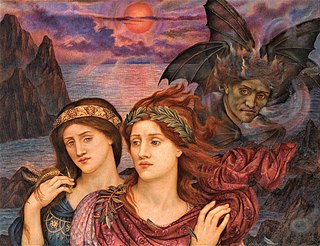
Clairvoyance is the magical ability to gain information about an object, person, location, or physical event through extrasensory perception. Any person who is claimed to have such ability is said to be a clairvoyant.

Extrasensory perception or ESP, also called sixth sense, is a claimed paranormal ability pertaining to reception of information not gained through the recognized physical senses, but sensed with the mind. The term was adopted by Duke University psychologist J. B. Rhine to denote psychic abilities such as intuition, telepathy, psychometry, clairvoyance, clairaudience, clairsentience, empathy and their trans-temporal operation as precognition or retrocognition.

Sir John Carew Eccles was an Australian neurophysiologist and philosopher who won the 1963 Nobel Prize in Physiology or Medicine for his work on the synapse. He shared the prize with Andrew Huxley and Alan Lloyd Hodgkin.

The mind is the set of faculties responsible for all mental phenomena. Often the term is also identified with the phenomena themselves. These faculties include thought, imagination, memory, will, and sensation. They are responsible for various mental phenomena, like perception, pain experience, belief, desire, intention, and emotion. Various overlapping classifications of mental phenomena have been proposed. Important distinctions group them according to whether they are sensory, propositional, intentional, conscious, or occurrent. Minds were traditionally understood as substances but it is more common in the contemporary perspective to conceive them as properties or capacities possessed by humans and higher animals. Various competing definitions of the exact nature of the mind or mentality have been proposed. Epistemic definitions focus on the privileged epistemic access the subject has to these states. Consciousness-based approaches give primacy to the conscious mind and allow unconscious mental phenomena as part of the mind only to the extent that they stand in the right relation to the conscious mind. According to intentionality-based approaches, the power to refer to objects and to represent the world is the mark of the mental. For behaviorism, whether an entity has a mind only depends on how it behaves in response to external stimuli while functionalism defines mental states in terms of the causal roles they play. Central questions for the study of mind, like whether other entities besides humans have minds or how the relation between body and mind is to be conceived, are strongly influenced by the choice of one's definition.

Parapsychology is the study of alleged psychic phenomena and other paranormal claims, for example, those related to near-death experiences, synchronicity, apparitional experiences, etc. Criticized as being a pseudoscience, the majority of mainstream scientists reject it. Parapsychology has also been criticised by mainstream critics for many of its practitioners claiming that their studies are plausible in spite of there being no convincing evidence for the existence of any psychic phenomena after more than a century of research.
Parapsychology is a field of research that studies a number of ostensible paranormal phenomena, including telepathy, precognition, clairvoyance, psychokinesis, near-death experiences, reincarnation, and apparitional experiences.

Telepathy is the purported vicarious transmission of information from one person's mind to another's without using any known human sensory channels or physical interaction. The term was first coined in 1882 by the classical scholar Frederic W. H. Myers, a founder of the Society for Psychical Research (SPR), and has remained more popular than the earlier expression thought-transference.

Precognition is the purported psychic phenomenon of seeing, or otherwise becoming directly aware of, events in the future.

Joseph Banks Rhine, usually known as J. B. Rhine, was an American botanist who founded parapsychology as a branch of psychology, founding the parapsychology lab at Duke University, the Journal of Parapsychology, the Foundation for Research on the Nature of Man, and the Parapsychological Association. Rhine wrote the books Extrasensory Perception and Parapsychology: Frontier Science of the Mind.
Henry Habberley Price, usually cited as H. H. Price, was a Welsh philosopher, known for his work on the philosophy of perception. He also wrote on parapsychology.

Curt John Ducasse was a French-born American philosopher who taught at the University of Washington and Brown University.
The American Society for Psychical Research (ASPR) is the oldest psychical research organization in the United States dedicated to parapsychology. It maintains offices and a library, in New York City, which are open to both members and the general public. The society has an open membership, anyone with an interest in psychical research is invited to join. It maintains a website; and publishes the quarterly Journal of the American Society for Psychical Research.

Samuel George Soal (1889–1975) was a British mathematician and parapsychologist. He was charged with fraudulent production of data in his work in parapsychology.

Kenneth Macfarlane Walker was a British author, philosopher and urological surgeon.

Joseph Gaither Pratt was an American psychologist who specialized in the field of parapsychology. Among his research interests were extrasensory perception, psychokinesis, mediumship and poltergeists.
Koneru Ramakrishna Rao was an Indian philosopher who served as Chancellor of GITAM, and as Chairman of GITAM school of Gandhian Studies, psychologist, parapsychologist, educationist, teacher, researcher and administrator. The Government of India awarded him the civilian honour of Padma Shri in 2011.

Extrasensory Perception is a 1934 book written by parapsychologist Joseph Banks Rhine, which discusses his research work at Duke University. Extrasensory perception is the ability to acquire information shielded from the senses, and the book was "of such a scope and of such promise as to revolutionize psychical research and to make its title literally a household phrase".

Varieties of Anomalous Experience: Examining the Scientific Evidence is a book edited by Etzel Cardeña, Steven Jay Lynn and Stanley Krippner and published by the American Psychological Association. The first edition was published in 2000 and a second edition in 2014. The book is dedicated to the research of William James.

Charles Edward Mark Hansel was a British psychologist most notable for his criticism of parapsychological studies.

Alan Richard White was an analytic philosopher who worked mainly in epistemology, the philosophy of mind, and, latterly, legal philosophy. Peter Hacker notes that he was "the most skillful developer of Rylean ... ideas in philosophical psychology" and that "if anyone surpassed Austin in subtlety and refinement in the discrimination of grammatical differences, it was White." Richard Swinburne remarks that "during the heyday of 'ordinary language philosophy' no tongue practised it better."
















